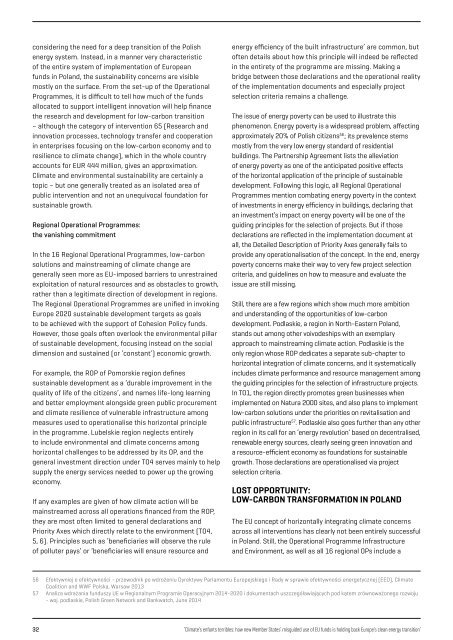ENFANTS TERRIBLES
enfants-terribles
enfants-terribles
You also want an ePaper? Increase the reach of your titles
YUMPU automatically turns print PDFs into web optimized ePapers that Google loves.
considering the need for a deep transition of the Polish<br />
energy system. Instead, in a manner very characteristic<br />
of the entire system of implementation of European<br />
funds in Poland, the sustainability concerns are visible<br />
mostly on the surface. From the set-up of the Operational<br />
Programmes, it is difficult to tell how much of the funds<br />
allocated to support intelligent innovation will help finance<br />
the research and development for low-carbon transition<br />
– although the category of intervention 65 (Research and<br />
innovation processes, technology transfer and cooperation<br />
in enterprises focusing on the low-carbon economy and to<br />
resilience to climate change), which in the whole country<br />
accounts for EUR 444 million, gives an approximation.<br />
Climate and environmental sustainability are certainly a<br />
topic – but one generally treated as an isolated area of<br />
public intervention and not an unequivocal foundation for<br />
sustainable growth.<br />
Regional Operational Programmes:<br />
the vanishing commitment<br />
In the 16 Regional Operational Programmes, low-carbon<br />
solutions and mainstreaming of climate change are<br />
generally seen more as EU-imposed barriers to unrestrained<br />
exploitation of natural resources and as obstacles to growth,<br />
rather than a legitimate direction of development in regions.<br />
The Regional Operational Programmes are unified in invoking<br />
Europe 2020 sustainable development targets as goals<br />
to be achieved with the support of Cohesion Policy funds.<br />
However, those goals often overlook the environmental pillar<br />
of sustainable development, focusing instead on the social<br />
dimension and sustained (or ‘constant’) economic growth.<br />
For example, the ROP of Pomorskie region defines<br />
sustainable development as a ‘durable improvement in the<br />
quality of life of the citizens’, and names life-long learning<br />
and better employment alongside green public procurement<br />
and climate resilience of vulnerable infrastructure among<br />
measures used to operationalise this horizontal principle<br />
in the programme. Lubelskie region neglects entirely<br />
to include environmental and climate concerns among<br />
horizontal challenges to be addressed by its OP, and the<br />
general investment direction under TO4 serves mainly to help<br />
supply the energy services needed to power up the growing<br />
economy.<br />
If any examples are given of how climate action will be<br />
mainstreamed across all operations financed from the ROP,<br />
they are most often limited to general declarations and<br />
Priority Axes which directly relate to the environment (TO4,<br />
5, 6). Principles such as ‘beneficiaries will observe the rule<br />
of polluter pays’ or ‘beneficiaries will ensure resource and<br />
energy efficiency of the built infrastructure’ are common, but<br />
often details about how this principle will indeed be reflected<br />
in the entirety of the programme are missing. Making a<br />
bridge between those declarations and the operational reality<br />
of the implementation documents and especially project<br />
selection criteria remains a challenge.<br />
The issue of energy poverty can be used to illustrate this<br />
phenomenon. Energy poverty is a widespread problem, affecting<br />
approximately 20% of Polish citizens 56 ; its prevalence stems<br />
mostly from the very low energy standard of residential<br />
buildings. The Partnership Agreement lists the alleviation<br />
of energy poverty as one of the anticipated positive effects<br />
of the horizontal application of the principle of sustainable<br />
development. Following this logic, all Regional Operational<br />
Programmes mention combating energy poverty in the context<br />
of investments in energy efficiency in buildings, declaring that<br />
an investment’s impact on energy poverty will be one of the<br />
guiding principles for the selection of projects. But if those<br />
declarations are reflected in the implementation document at<br />
all, the Detailed Description of Priority Axes generally fails to<br />
provide any operationalisation of the concept. In the end, energy<br />
poverty concerns make their way to very few project selection<br />
criteria, and guidelines on how to measure and evaluate the<br />
issue are still missing.<br />
Still, there are a few regions which show much more ambition<br />
and understanding of the opportunities of low-carbon<br />
development. Podlaskie, a region in North-Eastern Poland,<br />
stands out among other voivodeships with an exemplary<br />
approach to mainstreaming climate action. Podlaskie is the<br />
only region whose ROP dedicates a separate sub-chapter to<br />
horizontal integration of climate concerns, and it systematically<br />
includes climate performance and resource management among<br />
the guiding principles for the selection of infrastructure projects.<br />
In TO1, the region directly promotes green businesses when<br />
implemented on Natura 2000 sites, and also plans to implement<br />
low-carbon solutions under the priorities on revitalisation and<br />
public infrastructure 57 . Podlaskie also goes further than any other<br />
region in its call for an ‘energy revolution’ based on decentralised,<br />
renewable energy sources, clearly seeing green innovation and<br />
a resource-efficient economy as foundations for sustainable<br />
growth. Those declarations are operationalised via project<br />
selection criteria.<br />
LOST OPPORTUNITY:<br />
LOW-CARBON TRANSFORMATION IN POLAND<br />
The EU concept of horizontally integrating climate concerns<br />
across all interventions has clearly not been entirely successful<br />
in Poland. Still, the Operational Programme Infrastructure<br />
and Environment, as well as all 16 regional OPs include a<br />
56<br />
57<br />
Efektywniej o efektywności - przewodnik po wdrożeniu Dyrektywy Parlamentu Europejskiego i Rady w sprawie efektywności energetycznej (EED), Climate<br />
Coalition and WWF Polska, Warsaw 2013<br />
Analiza wdrażania funduszy UE w Regionalnym Programie Operacyjnym 2014-2020 i dokumentach uszczegóławiających pod kątem zrównoważonego rozwoju<br />
- woj. podlaskie, Polish Green Network and Bankwatch, June 2014<br />
32<br />
‘Climate’s enfants terribles: how new Member States’ misguided use of EU funds is holding back Europe’s clean energy transition’


